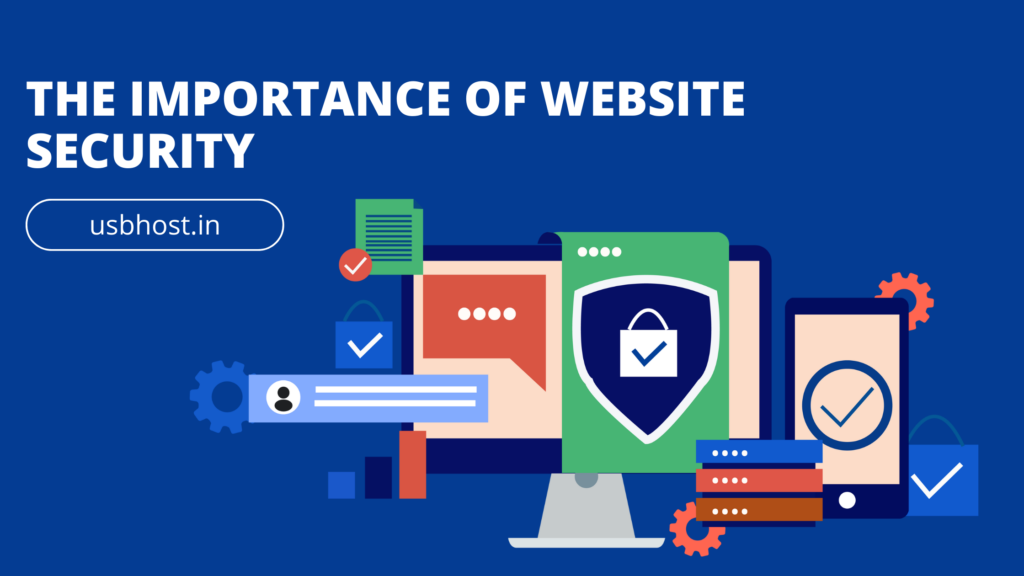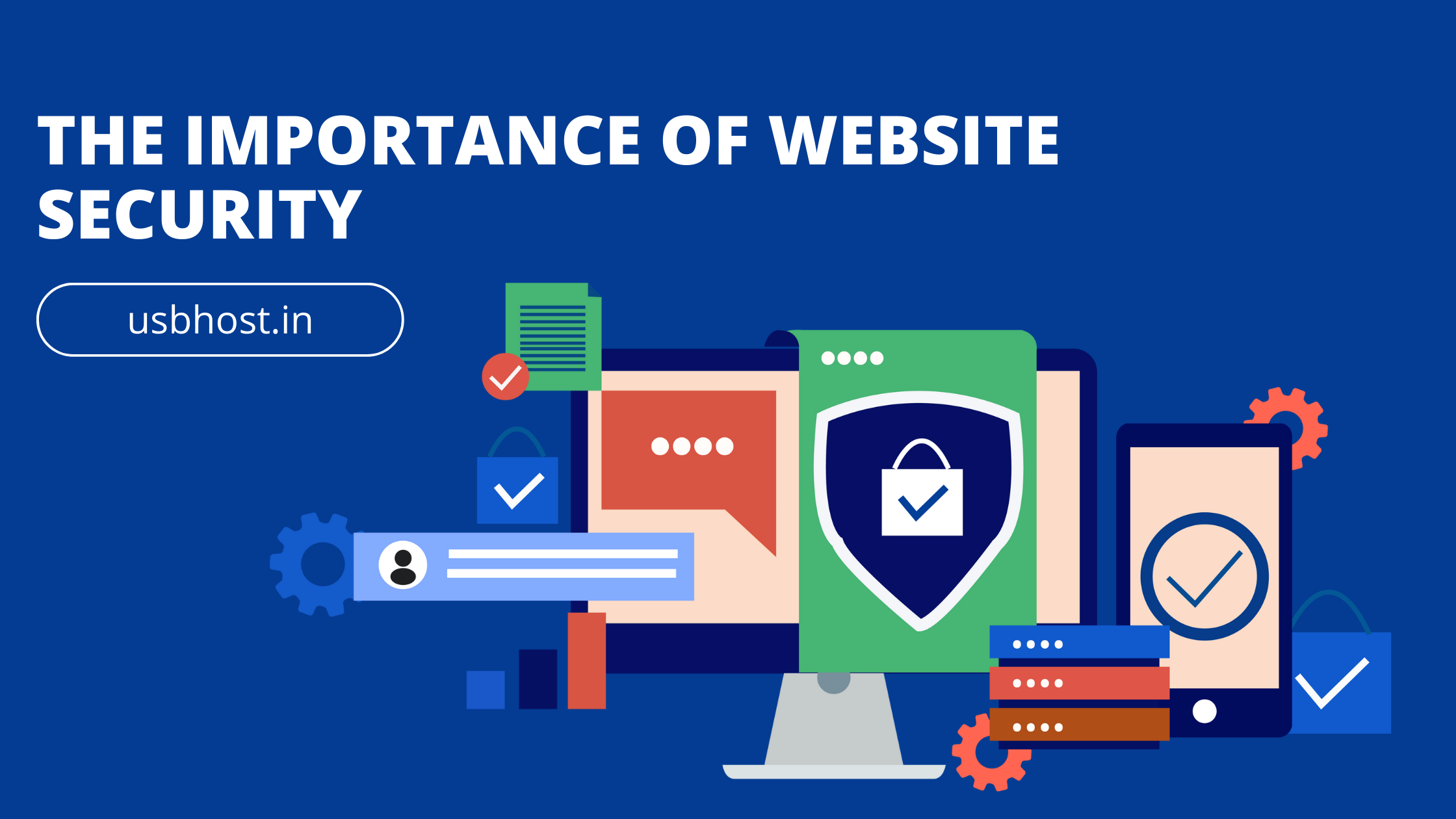Why website security matters! Discover the importance of protecting your online presence and data with strong website security measures. Learn more now.
The Internet has become an indispensable tool in an era of the rapid digitalization of businesses, education, and personal interactions. With increasing dependence on online platforms, the security of websites has become a significant concern, especially in a country like India, where the digital landscape is evolving at a remarkable pace. Given the increasing cyber threats that threaten sensitive data, financial transactions, and the overall integrity of online experiences, the importance of website security cannot be underestimated.
Table of Contents

Understanding Website Security
Website security includes several measures and protocols aimed at protecting websites from potential cyber threats and unauthorized access. These threats range from data breaches, hacking attempts, and malware intrusions to phishing attacks. For any business or individual with an online presence, whether it’s a small blog or a large-scale e-commerce platform, ensuring strong website security is non-negotiable.
Indian Digital Sector: Challenges and Opportunities.
India’s digital transformation has been nothing short of revolutionary, driven by the increase in internet users and growing startup culture. However, this rapid growth brings its own set of challenges related to cybersecurity. With the adoption of digital payment systems, e-commerce platforms, and government initiatives such as Digital India, the susceptibility to cyber threats increases.
One of the key challenges in India’s digital landscape is the awareness and understanding of website security measures among businesses, organizations, and individual website owners. Often, small and medium-sized enterprises (SMEs) underestimate the importance of website security due to limited resources or lack of awareness, making them easy targets for cybercriminals.
However, amidst these challenges, a huge opportunity exists to enhance cyber security measures and create a secure digital environment. Government initiatives to promote cyber security awareness, coupled with the rise of tech startups specializing in cyber security solutions, pave the way for a more secure online ecosystem.
Impact of Inadequate Website Security
The consequences of inadequate website security can be far-reaching and devastating. For businesses, security breaches not only cause financial losses but also have a serious impact on their reputation and customer trust. In a country like India, where customer loyalty is vital to business sustainability, even a single security breach can cause irreparable damage.
Additionally, users’ data is at risk when websites lack stringent security measures. Examples of data breaches can lead to identity theft, financial fraud, and compromise of individuals’ privacy, which can result in serious consequences for affected users.
Steps Towards Advanced Website Security
- SSL Certificates:
Implementing an SSL (Secure Socket Layer) certificate is the first step towards establishing a secure connection between the user’s browser and the website. It encrypts the data exchanged between the user and the server, ensuring confidentiality and integrity. - Regular Software Updates:
It is important to frequently update website software, including plugins, themes, and content management systems (CMS) like WordPress, Drupal, etc. These updates often contain security patches that fix vulnerabilities exploited by hackers. - Strong Passwords and Two-Factor Authentication (2FA):
Encouraging the use of complex passwords and implementing two-factor authentication adds layer of security, making it challenging for unauthorized entities to access the website. - Website Firewall:
Installing a web application firewall (WAF) can help monitor and filter malicious traffic, preventing attacks such as SQL injection, cross-site scripting (XSS), and DDoS attacks. - Regular Security Audits:
Performing regular security audits and vulnerability assessments can identify potential weaknesses in a website’s security infrastructure, allowing timely mitigation.
Future trends in website security
As technology evolves, so do cyber threats. The future of website security in India will see advancements in Artificial Intelligence (AI) and Machine Learning (ML) algorithms employed to detect and prevent cyber attacks in real time. Additionally, the implementation of blockchain technology for better data security and the spread of Zero Trust security models will play a vital role in fortifying websites against emerging threats.
Conclusion:
In a digitally interconnected world, the importance of website security cannot be overemphasized. In India, where the digital landscape is growing rapidly, the need for strong cyber security measures is paramount. Businesses, organizations, and individuals should prioritize website security to protect sensitive data, protect user privacy, and maintain trust in the digital ecosystem. By implementing proactive measures and keeping up with emerging cybersecurity trends, India can strengthen its digital infrastructure and pave the way for a secure online environment for all.
Remember, a secure website isn’t just about protecting data; It’s about fostering trust and ensuring a seamless, reliable online experience for all users.
Through concerted efforts and a collective commitment towards cyber security, India can move forward with confidence into the digital landscape, ensuring a secure and resilient online future for generations to come.
FAQs
1. Why is website security important?
Website security is crucial as it protects not only your data but also your users’ information from potential cyber threats. It ensures the integrity and confidentiality of sensitive data stored on your website.
2. What are the common threats to website security?
Common threats include malware injections, phishing attacks, DDoS (Distributed Denial of Service) attacks, SQL injections, cross-site scripting (XSS), and brute force attacks aimed at gaining unauthorized access.
3. How does website security impact businesses?
A lack of adequate security measures can lead to data breaches, causing financial losses, damage to reputation, loss of customer trust, and legal consequences. Robust security is vital for sustaining a trustworthy online presence.
4. Is website security only important for e-commerce sites?
No, website security is essential for all websites, irrespective of their purpose or size. Every website holds sensitive data that can be targeted by cybercriminals, emphasizing the need for security measures.
5. What steps can I take to improve my website security?
c Implement SSL certificates, regularly update software and plugins, use strong passwords and two-factor authentication, install a web application firewall (WAF), and conduct regular security audits.
6. How does website security impact user trust?
A secure website creates a sense of trust and reliability among users. When users feel confident that their data is safe, they are more likely to engage, make purchases, and interact with the website.
7. Can small businesses afford robust website security?
Yes, there are various cost-effective security measures available. Many security tools offer scalable solutions suitable for small businesses, ensuring protection within budget constraints.
8. What are the legal implications of inadequate website security?
Inadequate security measures can result in legal consequences such as penalties for non-compliance with data protection regulations and potential lawsuits from affected users due to data breaches.
9. Is it possible to completely prevent cyber attacks?
While no system is completely immune to attacks, robust security measures significantly reduce the risk. Regular updates, strong security protocols, and user education create formidable barriers against cyber threats.
10. How frequently should website security measures be updated?
Security measures should be consistently updated and monitored. Regular updates for software, security patches, and periodic security audits are vital to stay ahead of evolving cyber threats.
These FAQs aim to address common concerns and queries regarding the importance of website security, helping individuals and businesses understand its significance and take necessary measures to protect their online presence.

